Living with and beyond cancer: The improvement story so far - NHS ...
Living with and beyond cancer: The improvement story so far - NHS ...
Living with and beyond cancer: The improvement story so far - NHS ...
You also want an ePaper? Increase the reach of your titles
YUMPU automatically turns print PDFs into web optimized ePapers that Google loves.
34 | <strong>Living</strong> <strong>with</strong> <strong>and</strong> <strong>beyond</strong> <strong>cancer</strong>: <strong>The</strong> <strong>improvement</strong> <strong>story</strong> <strong>so</strong> <strong>far</strong><br />
<strong>NHS</strong> Luton<br />
Increasing primary care skills <strong>and</strong> knowledge has<br />
reduced length of stay, unnecessary appointments <strong>and</strong><br />
admissions to hospital for patients <strong>with</strong> <strong>cancer</strong><br />
Summary<br />
• An education programme for<br />
professionals has been developed to<br />
support the provision of an oncology<br />
service in primary care <strong>and</strong> improve<br />
the quality of care for patients during<br />
<strong>and</strong> after treatment for <strong>cancer</strong><br />
• <strong>The</strong> programme offers a range of<br />
learning events for GPs, district<br />
nurses <strong>and</strong> other health <strong>and</strong> <strong>so</strong>cial<br />
care staff covering a wide range of<br />
topics, <strong>and</strong> enhances the knowledge<br />
of community practitioners <strong>and</strong> their<br />
confidence to support <strong>cancer</strong> patients<br />
following treatment<br />
• <strong>The</strong> education programme was<br />
established prior to this project <strong>and</strong><br />
has enabled the testing of primary<br />
care led services.<br />
<strong>The</strong> Problem<br />
• <strong>NHS</strong> Luton identified that patients<br />
were admitted <strong>and</strong> experienced<br />
extended stays in hospital in order to<br />
receive treatment for their <strong>cancer</strong> or<br />
the side effects of treatment<br />
• <strong>The</strong> community based palliative care<br />
team used agreed criteria for referral<br />
to their service however lacked<br />
capacity <strong>and</strong> skills to manage patients<br />
earlier in their journey as re<strong>so</strong>urces<br />
were targeted at those nearing the<br />
end of life<br />
• <strong>The</strong> district nursing teams felt they<br />
lacked the knowledge <strong>and</strong> skills to<br />
care for these patients (e.g. <strong>with</strong><br />
venous lines, neutropaenia, nausea<br />
<strong>and</strong> vomiting etc) resulting in delayed<br />
discharges, unnecessary emergency<br />
admissions or GP appointments<br />
• To address the above problems, <strong>NHS</strong><br />
Luton seconded one team member to<br />
complete their ENB 237 to act as a<br />
re<strong>so</strong>urce in providing knowledge <strong>and</strong><br />
advice <strong>with</strong>in the specialist palliative<br />
care team <strong>and</strong> to other primary care<br />
based health professionals<br />
• It was quickly identified that the new<br />
skills of the individual were not<br />
optimised as she remained part of<br />
the palliative care service<br />
• Access to this new knowledge <strong>and</strong><br />
skill was limited to the individuals<br />
availability<br />
• It did not provide a sustainable<br />
<strong>so</strong>lution for an oncology service.<br />
What was done<br />
<strong>The</strong> service was re-designed to include<br />
the following:<br />
• A primary care oncology service to<br />
provide care for patients <strong>with</strong> any<br />
tumour type on a curative pathways<br />
supporting all types of treatment<br />
• An agreed operational policy <strong>and</strong><br />
referral criteria<br />
• An ongoing training programme<br />
tailored to the needs of primary care<br />
staff to enable more patients to be<br />
cared for at home.<br />
<strong>The</strong> training programme collaboratively<br />
works <strong>with</strong> the acute <strong>and</strong> independent<br />
sector <strong>and</strong> is open to all health <strong>and</strong><br />
<strong>so</strong>cial care professionals <strong>with</strong>in the<br />
<strong>cancer</strong> network. <strong>The</strong> programme<br />
delivers 14 workshops coordinated by<br />
the Macmillan Lecturer Practitioner<br />
<strong>with</strong>in <strong>NHS</strong> Luton Community Services.<br />
Training sessions pertaining specifically<br />
to oncology include:<br />
• Introduction to oncology <strong>and</strong><br />
treatments – one day course run by<br />
specialist nurses, AHPs <strong>and</strong> doctors x<br />
two per year. Content includes: ’what<br />
is <strong>cancer</strong>’, staging treatments <strong>and</strong><br />
side-effects the <strong>cancer</strong> pathway from<br />
awareness to survivorship, ongoing<br />
surveillance, <strong>and</strong> oncology<br />
emergencies. Each workshop focuses<br />
on a different tumour group <strong>with</strong><br />
research <strong>and</strong> latest management<br />
• Oncology emergencies content<br />
includes – awareness, signs <strong>and</strong><br />
symptoms of neutropaenia,<br />
hypercalcaemia, supra vena cava<br />
obstruction, intestinal obstruction<br />
<strong>and</strong> haemorrhage<br />
• <strong>The</strong> management of central venous<br />
devices for long term<br />
haematology/oncology treatment<br />
content includes – anatomy <strong>and</strong><br />
physiology, position of lines,<br />
management <strong>and</strong> safe practice.<br />
A variety of delivery mechanisms were<br />
agreed <strong>and</strong> tested <strong>and</strong> included<br />
sessions for out of hours teams, ‘lunch<br />
<strong>and</strong> learn’ sessions for community staff<br />
<strong>and</strong> evening <strong>and</strong> Saturday session for<br />
GPs on topics requested by them such<br />
as Neutropaenia, local research trials,<br />
oncology drugs, oncology emergencies.<br />
Training is held mainly in health centres<br />
or other venues as long as they are<br />
free!<br />
All sessions attract CPD points <strong>and</strong> any<br />
practical skills training is accredited<br />
when competence is reached.<br />
What difference has the education<br />
programme made<br />
Quality<br />
• Central lines are now inserted in<br />
outpatients rather than on the wards<br />
<strong>with</strong> referral direct to district nurses<br />
for line management etc. which has<br />
saved approximately 550 hospital<br />
visits during ’2008-09 for regular line<br />
flushes <strong>and</strong> as<strong>so</strong>ciated travel/parking<br />
costs, <strong>and</strong> reduced the risk of<br />
hospital acquired infection



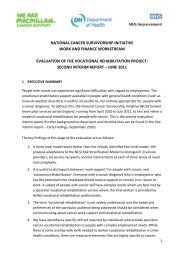
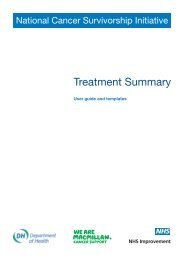
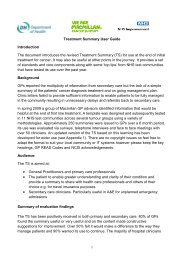
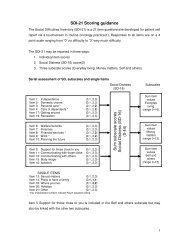
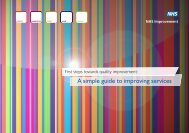
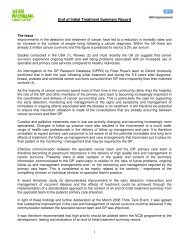
![Download the how to guide [PDF] - Macmillan Cancer Support](https://img.yumpu.com/47067428/1/184x260/download-the-how-to-guide-pdf-macmillan-cancer-support.jpg?quality=85)
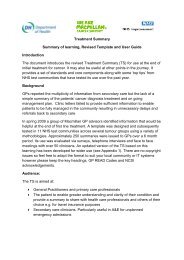

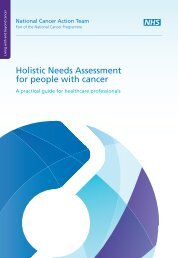
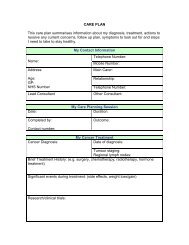

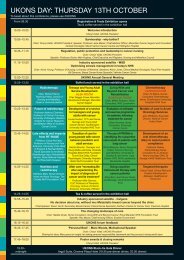
![HOPE Protocol [PDF, 420KB] - National Cancer Survivorship Initiative](https://img.yumpu.com/32566432/1/184x260/hope-protocol-pdf-420kb-national-cancer-survivorship-initiative.jpg?quality=85)